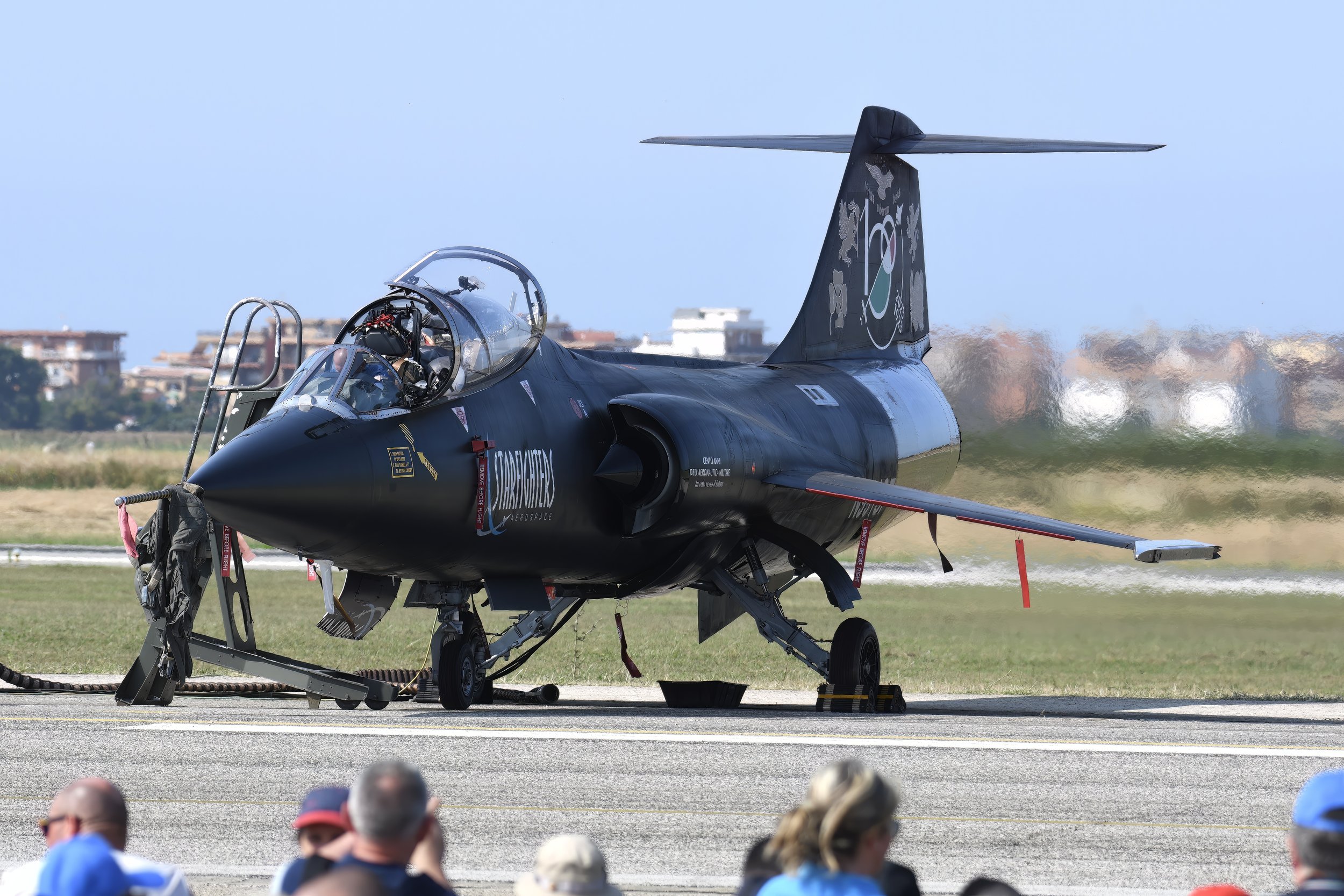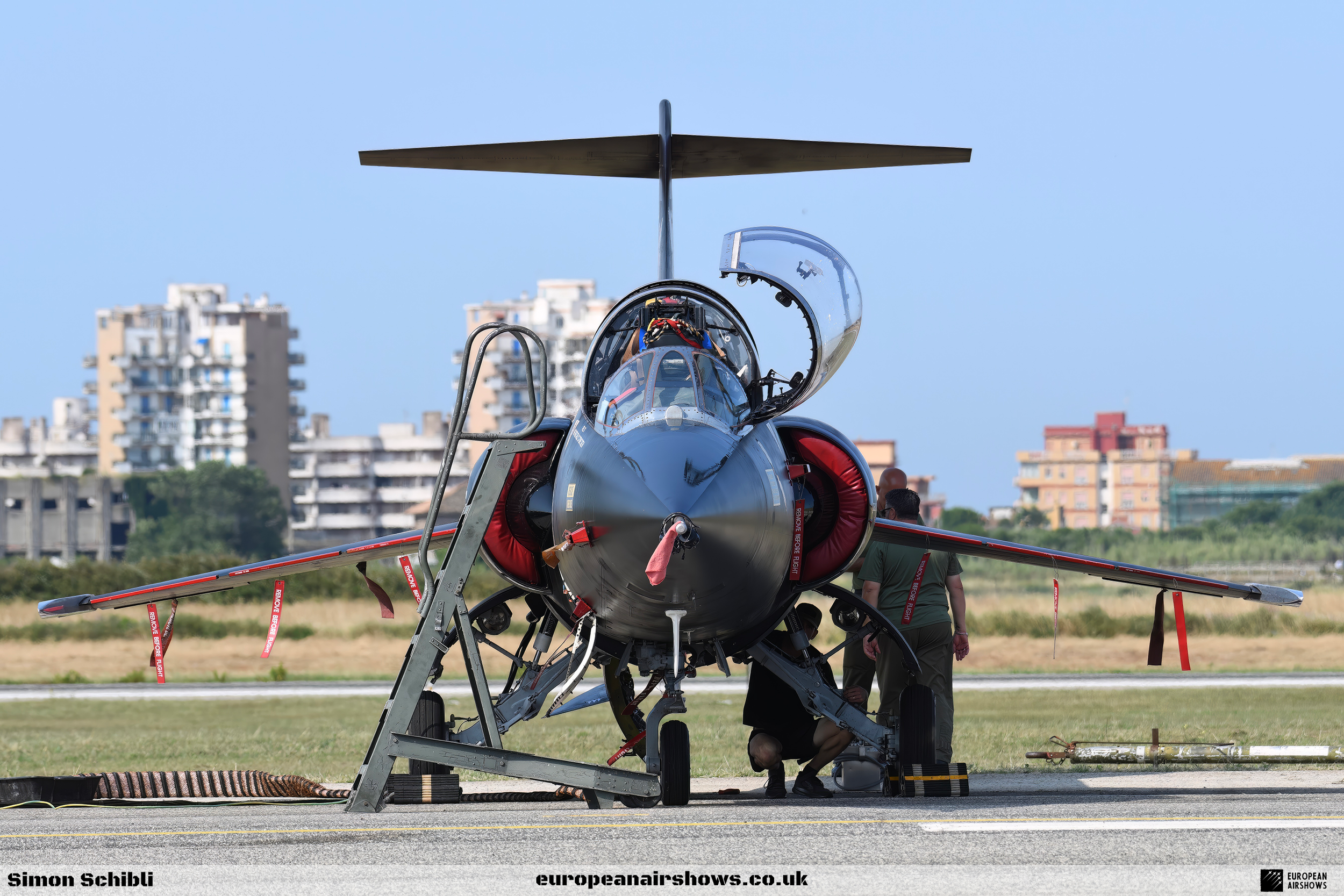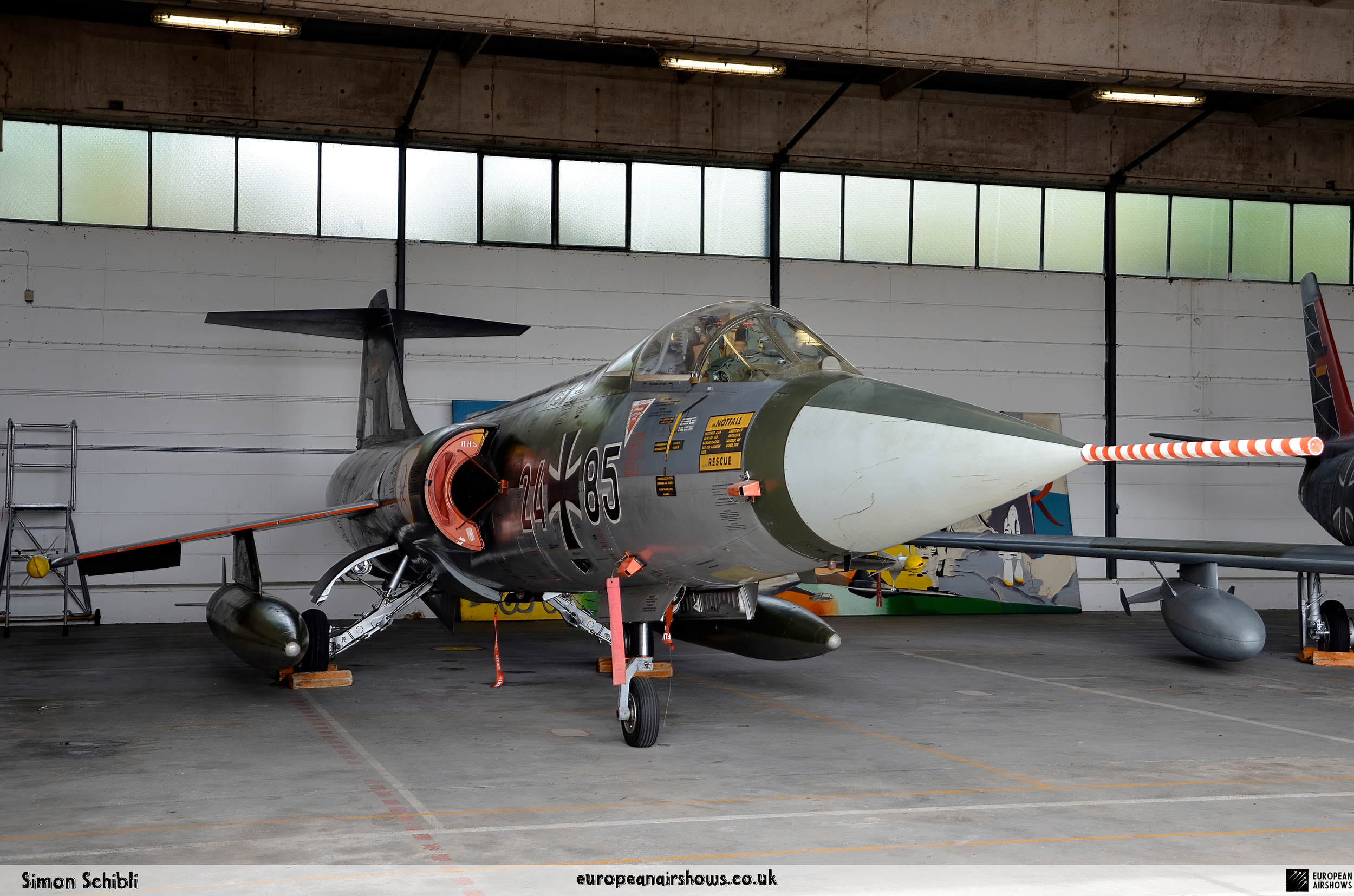
March 4 / F-104 Starfighter first flight
First Flight 4 March 1954
Lockheed F-104 Starfighter
Picture this: it’s the early 1950s, the Cold War is heating up faster than a microwave burrito, and the U.S. Air Force is on a mission. They’ve got their eyes on the skies, where Soviet bombers are lurking like shadowy villains in a spy flick. What they need is a fighter jet that’s faster than a speeding bullet, climbs higher than a mountain goat on a rocket, and... well, doesn’t exactly turn tighter than a twist tie—more like it needs a county’s worth of airspace to swing around. Enter the F-104 Starfighter—a plane so sleek and audacious it could’ve starred in its own blockbuster, leaving its enemies in the dust while politely declining to dance in tight circles.
The F-104’s origin story begins with a genius named Clarence “Kelly” Johnson, the mastermind at Lockheed who’d already wowed the world with the P-38 Lightning and the sneaky U-2 spy plane. In 1952, with the Cold War clock ticking, Johnson and his team set out to build a jet that was less “jack of all trades” and more “master of speed.” The result? A design so radical it looked like it belonged in a sci-fi comic. The heart of the Starfighter was the General Electric J79 turbojet engine—a roaring beast pumping out up to 15,800 pounds of thrust with its afterburner blazing. That’s like strapping a Saturn V rocket to a skateboard! The airframe was a skinny, needle-nosed marvel with wings so tiny—barely 21 feet across—they were practically an afterthought. Those razor-thin wings were so sharp that ground crews had to slap protective covers on them to keep pilots from slicing their hands during maintenance. With its long fuselage and stubby wings, the F-104 earned monikers like “the missile with a man in it” and, more ominously, “the flying coffin.” Spoiler alert: that last nickname wasn’t just for show.
The Starfighter took its first leap into the sky on March 4, 1954, when the XF-104 prototype roared off the runway at Edwards Air Force Base with test pilot Tony LeVier at the helm. That maiden flight wasn’t flawless—the landing gear threw a tantrum and refused to retract—but it was enough to prove the concept. A second prototype followed later that year, and by 1956, the F-104A was rolling off the production line, ready to dazzle (or terrify) anyone who dared fly it. This jet was built for one thing: speed. On May 18, 1958, an F-104A screamed across the sky at 1,404.19 miles per hour, snagging a world speed record and leaving the sound barrier in its dust ( Mach 2, baby!). Not satisfied with just being fast, the Starfighter aimed for the stars—literally. On December 14, 1959, an F-104C piloted by Captain Joe Jordan soared to 103,389 feet, nearly 20 miles up, setting an altitude record that made it the king of the stratosphere. Pilots nicknamed it a “homesick angel” because it climbed like it was desperate to get back to heaven.
But here’s the catch: that blistering speed and agility came with a wild side. Those tiny wings made the F-104 a dream to maneuver but a nightmare to land. Touching down at around 180 knots (207 mph), it was like trying to park a Formula 1 car on a postage stamp. For rookie pilots, it was a baptism by fire—and not everyone passed the test. The U.S. Air Force first deployed the F-104A as an interceptor, designed to chase down high-flying Soviet bombers with its single 20mm cannon and a pair of Sidewinder missiles. But the Cold War had other plans. The USAF soon realized the Starfighter’s short range and limited payload weren’t ideal for a world shifting toward versatile, do-it-all aircraft. So, they pivoted. The F-104C rolled out with better avionics, bomb racks, and rocket pods, turning it into a tactical fighter and reconnaissance hotshot. Still, by the mid-1960s, the USAF was ready to trade up for the F-4 Phantom II, leaving the Starfighter looking for a new gig.
That’s when the F-104 went global—and oh boy, did it make waves. Lockheed saw dollar signs in the international market and pitched the Starfighter to NATO allies as a high-performance bargain. Countries like Germany, Italy, Canada, and Japan jumped on board, with Germany going all-in by ordering over 900 of the jets. The Luftwaffe envisioned the F-104 as a multi-role maestro—fighter-bomber, interceptor, recon star—but reality hit harder than a MiG at Mach 2. The Starfighter was a demanding diva, and German pilots struggled to tame it. Between 1961 and 1989, the Luftwaffe lost 292 of their 916 F-104s, with 115 pilots paying the ultimate price. The German press dubbed it the “Witwenmacher”—the “widowmaker”—and the name stuck like glue. Was it a design flaw? Not entirely. Experts chalked up many crashes to pilot error and rushed training programs, but that didn’t stop the F-104’s rep from taking a nosedive.
Don’t write off the Starfighter just yet, though—it had its shining moments. In the Vietnam War, F-104Cs strutted their stuff in Southeast Asia, escorting EC-121 radar planes and even bagging a few MiG kills in air-to-air showdowns. Their role was small, though, and they soon handed the stage to more versatile jets. Elsewhere, the F-104 kept soaring. Italy adored it, flying the Starfighter until 2004—practically ancient history for a jet born in the ‘50s. The Italians even tricked out their F-104S variant with fancy radar and Sparrow missiles, proving this old dog could learn new tricks. Meanwhile, NASA got in on the action, using F-104s as high-speed guinea pigs and astronaut trainers. The NF-104A, souped up with an extra rocket engine, blasted to over 120,000 feet, giving pilots a taste of near-spaceflight and prepping them for the X-15 program.
As the decades rolled on, the F-104’s time in the spotlight faded. By the 1980s, most air forces had traded their Starfighters for newer toys, but its legacy refused to retire. This needle-nosed speed demon inspired future designs and cemented its place as a Cold War icon. Was it perfect? Heck no. Its safety record was sketchy, and its quirks were legendary, but the F-104 Starfighter was a marvel of its era. Kelly Johnson and his Lockheed crew pushed the envelope so hard it tore, creating a jet that lived fast, flew high, and left aviation buffs gawking decades later. So next time you spot a photo of that sleek, winged wonder, tip your hat to the wild ride that was the F-104—a plane that danced on the edge of brilliance and chaos, and somehow stole the show.
Starfighter Facts
The "Missile with a Man in It": The F-104 Starfighter wasn’t just a plane—it earned the nickname "The Missile with a Man in It" thanks to its sleek, rocket-like fuselage and blistering speed. Designed by Lockheed’s genius Clarence "Kelly" Johnson, this aircraft was built to streak through the skies and intercept Soviet bombers, embodying a design so streamlined it looked more like a missile than a traditional fighter jet.
First Fighter to Sustain Mach 2 Speeds: Hold onto your hat—the F-104 was the first operational fighter jet to sustain speeds over Mach 2, twice the speed of sound! Powered by the roaring General Electric J79 turbojet engine, it could hit 1,320 mph (2,125 km/h), leaving other aircraft of its era choking on its exhaust. This speed demon ruled the skies in the 1950s and 60s.
Climbed to the Edge of Space: On December 14, 1959, an F-104C soared to an astonishing 103,389 feet (31,513 meters)—that’s nearly 20 miles above Earth! This world altitude record showcased its ability to operate at the edge of the atmosphere, making it a high-flying interceptor that could take on any threat from above.
The Infamous "Widowmaker": The F-104’s incredible performance came with a dark side—it earned the nickname "Witwenmacher" ("Widowmaker") in the German Air Force due to its high accident rate. Over 30% of Germany’s F-104 fleet crashed, a result of its tricky handling and use in low-level roles it wasn’t designed for. Despite the danger, its pilots loved the thrill of mastering this beast.
Downward-Firing Ejection Seat Madness: Early F-104s had a downright wild feature: a downward-firing ejection seat! Pilots ejected beneath the aircraft to avoid its towering tail fin at high speeds. While clever in theory, it was a nightmare at low altitudes—imagine trying to bail out close to the ground with nowhere to go but down. Later models wisely switched to upward ejection.
NASA’s Astronaut Trainer: The F-104 wasn’t just a war machine—it helped humanity reach the stars! NASA used modified F-104s to train astronauts like Neil Armstrong for high-altitude missions. These jets mimicked the steep descents of the X-15 rocket plane and even prepped pilots for the Space Shuttle, bridging the gap between aviation and spaceflight.
Wings Sharp Enough to Cut: The F-104’s wings were so thin and razor-sharp—measuring just 0.016 inches (0.41 mm) at the leading edge—that they were a literal hazard to ground crews! Protective covers were slapped on during maintenance to prevent injuries. This extreme design slashed drag and boosted speed, but it demanded respect on the ground.
A Cold War Export Superstar: The F-104 was a global sensation, flying for over a dozen air forces, including Germany, Italy, Canada, Japan, and Taiwan. Lockheed’s slick marketing and U.S. Cold War alliances made it a NATO staple, with some nations like Italy keeping it in service until 2004—nearly 50 years after its 1954 debut. Talk about staying power!
Battle-Tested in Vietnam and Beyond: Though built as an interceptor, the F-104 proved its mettle in combat. In the Vietnam War, F-104Cs flew air superiority and ground-attack missions, while in the Indo-Pakistani Wars, Pakistani pilots used it to down Indian aircraft. Its speed and agility made it a fierce contender, even if its short range limited its role.
A Trailblazer for Future Fighters: The F-104’s legacy is written in the sky—it pioneered high-speed, high-altitude flight and influenced iconic jets like the F-16 Fighting Falcon and the Soviet MiG-21. Its sleek design and relentless focus on performance set the stage for the next generation of fighters, cementing its place as a Cold War aviation legend.














